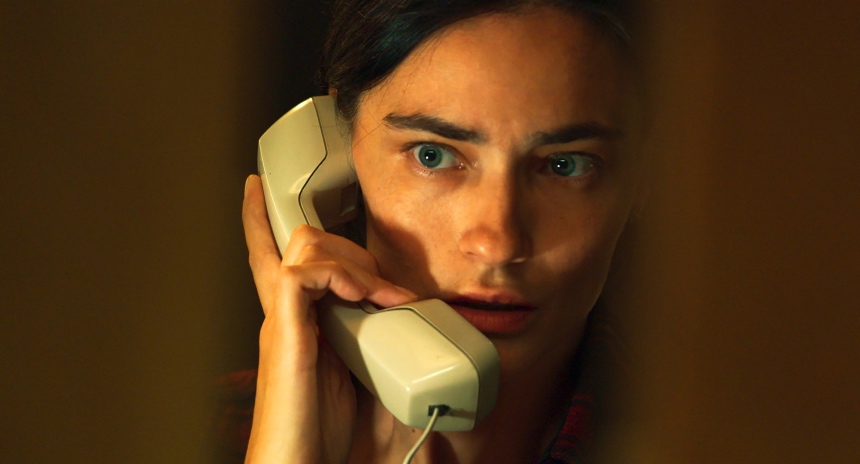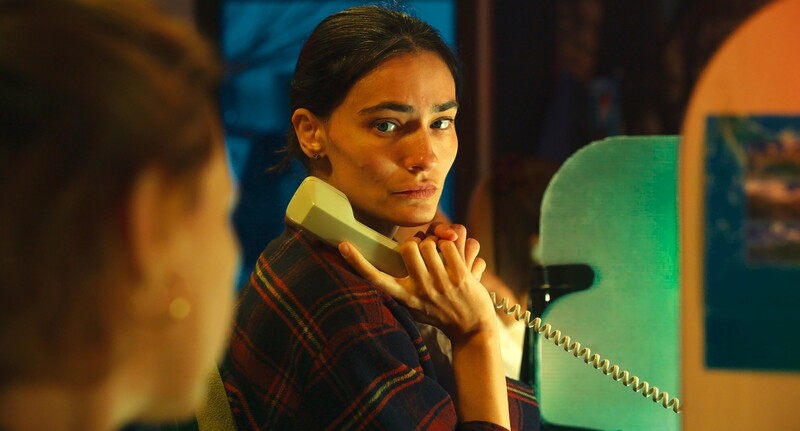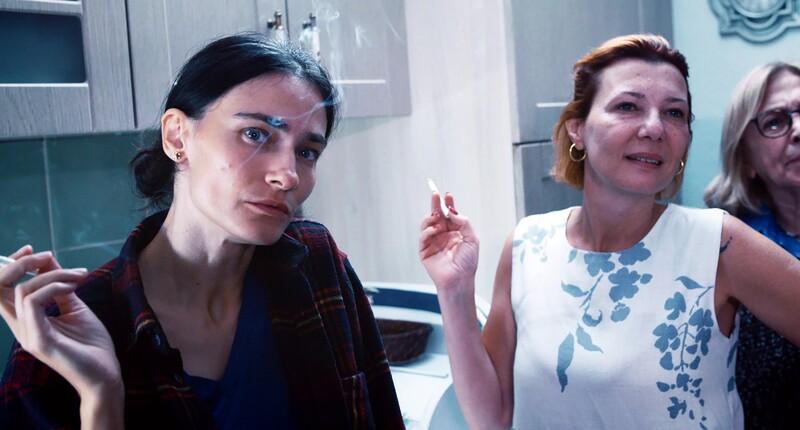Berlinale 2025 Review: CONFIDANTE, Power and Morality Collide in Chamber Thriller
Çağla Zencirci and Guillaume Giovanetti craft a restrained chamber thriller, merging socio-political inquiry with genre filmmaking to explore agency, entrapment, and power dynamics within the confines of an erotic call center in late-1990s Turkey.

The latest film directed and written by Çağla Zencirci and Guillaume Giovanetti, Confidante employs a high-concept premise to examine agency, entrapment, and the power dynamics embedded in both intimate and transactional exchanges.
Set in Ankara in 1999, the story follows a call center operator working for an erotic phone line who becomes entangled in a life-or-death situation when an earthquake traps a caller beneath the rubble. As he pleads for help, she realizes she has the means to alert rescuers. Doing so would reveal her clandestine profession, however, jeopardizing her livelihood and reputation in a society where maintaining appearances is often a matter of survival.
Zencirci and Giovanetti have long gravitated toward protagonists constrained by societal expectations. Noor and Ningen blended genres to examine identity and transformation, while Sibel followed a mute young woman navigating the rigid conventions of a traditional village. That film employed a whistled language both as a narrative tool and a thematic reflection on repression and resistance.
Confidante continues this exploration. Where Sibel unfolded against the backdrop of vast, mountainous landscapes, Confidante confines itself to a restricted setting. A dialogue-driven thriller, it manipulates space, or the lack of thereof, and sound to heighten tension.
Arzu (Saadet Işıl Aksoy) is a young mother amidst divorce proceedings while earning a living as a phone operator for an erotic hotline in a conservative, patriarchal society. The name Arzu is her working pseudonym, a necessary shield against the stigma and social exclusion associated with her profession. Skilled in managing the desires of her callers, she adeptly shifts between indulging fantasies, engaging in casual conversation with lonely elderly men, and handling the antics of prank-calling teenagers.
As Confidante unfolds over the course of a single night shift, Arzu cycles through the usual calls: lonely elders, teenagers playing pranks, and clients seeking fantasies. Then, a more unsettling call disrupts the routine.
Her working name and number have appeared in the phone records of a suspected criminal, inadvertently leading her to interfere with an ongoing sting operation connected to Turkey’s political elite. Though shaken, she hopes her anonymity will protect her.
Moments later, a series of earthquakes hit Ankara. One of the teenage prank callers from earlier becomes trapped under the rubble and, with no other options, dials the last number he called, Arzu’s. He pleads for help, placing her in a position where she must decide whether to act.
Torn between self-preservation and the instinct to help, she ultimately makes the call that could save him. The only person with the power to intervene, however, is the one implicated in the sting operation she unintentionally disrupted. What begins as a moral dilemma escalates into a dangerous entanglement, forcing Arzu into a precarious negotiation where the risks extend far beyond what she first imagined.
Arzu fits the mold of a typical Zencirci-Giovanetti protagonist: marginalized yet resourceful. The film presents the erotic call center industry, which thrived in 1990s Turkey, as both an avenue for financial autonomy and a system that ultimately reinforces patriarchal control. While the job provides women with economic independence, it also keeps them within the confines of societal expectations, where their labor is commodified yet their presence remains taboo.
Beyond Arzu’s personal struggle, Confidante engages with broader socio-political themes, reflecting Turkey’s evolving relationship with modernity and morality during a period of economic liberalization. As Western influences introduced shifts in cultural norms, traditional values remained entrenched, particularly in perceptions of women and their roles in society. The film situates Arzu at the intersection of these tensions, making her predicament not just a personal crisis.
Zencirci and Giovanetti keep the camera tightly focused on Arzu's face, occasionally using a medium shot, while the film remains confined to the claustrophobic rooms of the erotic call center. Arzu's limited mobility, resulting from an injury, compounds her sense of entrapment.
Caught between a call from the paralyzed teenager trapped under rubble and coercion on another line, she also attracts the attention of her boss. Initially, he admires her work ethic; later, his focus shifts to her beauty. When she fails to respond to his demonstration of affection as he expects, his regard turns to coercion and potential blackmail. In a single night, Arzu's predicament grows more complicated as she contends with different manifestations of masculinity.
Confidante begins as a subdued social drama, following a soon-to-be single mother facing a challenge of providing a stable life for herself and her son within a patriarchal society. Arzu is a sympathetic protagonist, stubborn at times but ultimately well-intentioned, despite the obstacles she faces.
Zencirci and Giovanetti establish a lighter tone early on, punctuating the film with moments of humor, particularly through the call center’s collegial banter and jokes at the expense of male callers. The film takes an abrupt turn as the situation escalates, however. What starts as a social dramedy quickly shifts gears, accelerating into a high-stakes political thriller.
The film relies heavily on dialogue, with much of the actual action unfolding off-screen. Arzu serves as the focal point through which events and their consequences are filtered, placing the weight of the performance on Saadet Işıl Aksoy. As she grapples with mounting dilemmas and time-sensitive decisions, the tension intensifies.
The cinematography by Eric Devin reinforces this sense of confinement. The camera remains tightly fixated on Arzu’s face, emphasizing her isolation. The call center’s layout, partitioned spaces and overhead walkways, further restricts her movement, a limitation made more pronounced by her injured leg. The warm, oversaturated tones of the set evoke the pre-digital aesthetic of the era, subtly grounding the film in its late-1990s setting.
Confidante bears traces of recent Iranian cinema, particularly in its depiction of women challenging patriarchal structures and in certain stylistic choices. Zencirci and Giovanetti shape their latest film into a more accessible arthouse work, though, blending genre elements to reach a broader audience.
While questions of morality are embedded in the story, they remain woven largely beneath the fabric of genre storytelling. The directors adopt a minimalist approach, using only a handful of elements to construct a tightly composed thriller that balances social and political inquiry while the screen is domianted by Saadet Işıl Aksoy´s performance.
Confidente
Director(s)
- Guillaume Giovanetti
- Çagla Zencirci
Cast
- Erkan Kolçak Köstendil
- Elit Andaç Çam
- Saadet Aksoy









